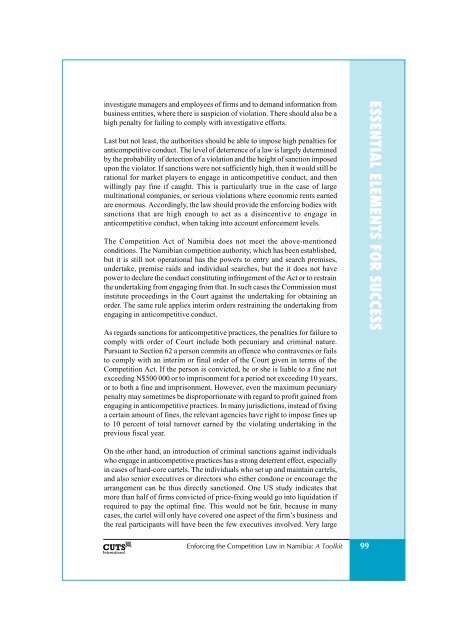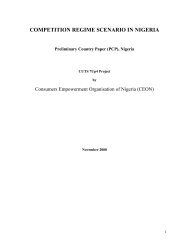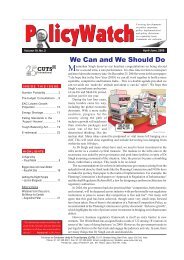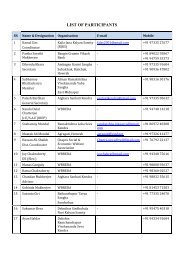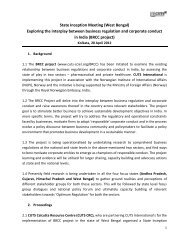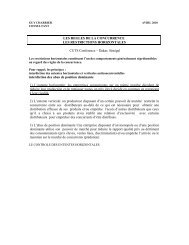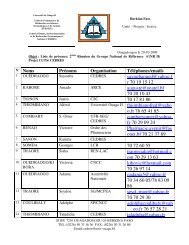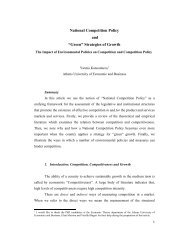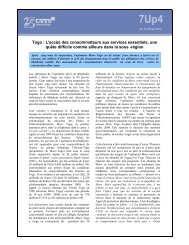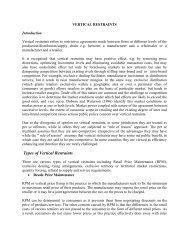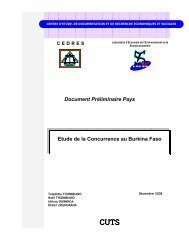<strong>in</strong>vestigate managers and employees of firms and to demand <strong>in</strong>formation frombus<strong>in</strong>ess entities, where <strong>the</strong>re is suspicion of violation. There should also be ahigh penalty for fail<strong>in</strong>g to comply with <strong>in</strong>vestigative efforts.Last but not least, <strong>the</strong> authorities should be able to impose high penalties foranticompetitive conduct. The level of deterrence of a law is largely determ<strong>in</strong>edby <strong>the</strong> probability of detection of a violation and <strong>the</strong> height of sanction imposedupon <strong>the</strong> violator. If sanctions were not sufficiently high, <strong>the</strong>n it would still berational for market players to engage <strong>in</strong> anticompetitive conduct, and <strong>the</strong>nwill<strong>in</strong>gly pay f<strong>in</strong>e if caught. This is particularly true <strong>in</strong> <strong>the</strong> case of largemult<strong>in</strong>ational companies, or serious violations where economic rents earnedare enormous. Accord<strong>in</strong>gly, <strong>the</strong> law should provide <strong>the</strong> enforc<strong>in</strong>g bodies withsanctions that are high enough to act as a dis<strong>in</strong>centive to engage <strong>in</strong>anticompetitive conduct, when tak<strong>in</strong>g <strong>in</strong>to account enforcement levels.The <strong>Competition</strong> Act of <strong>Namibia</strong> does not meet <strong>the</strong> above-mentionedconditions. The <strong>Namibia</strong>n competition authority, which has been established,but it is still not operational has <strong>the</strong> powers to entry and search premises,undertake, premise raids and <strong>in</strong>dividual searches, but <strong>the</strong> it does not havepower to declare <strong>the</strong> conduct constitut<strong>in</strong>g <strong>in</strong>fr<strong>in</strong>gement of <strong>the</strong> Act or to restra<strong>in</strong><strong>the</strong> undertak<strong>in</strong>g from engag<strong>in</strong>g from that. In such cases <strong>the</strong> Commission must<strong>in</strong>stitute proceed<strong>in</strong>gs <strong>in</strong> <strong>the</strong> Court aga<strong>in</strong>st <strong>the</strong> undertak<strong>in</strong>g for obta<strong>in</strong><strong>in</strong>g anorder. The same rule applies <strong>in</strong>terim orders restra<strong>in</strong><strong>in</strong>g <strong>the</strong> undertak<strong>in</strong>g fromengag<strong>in</strong>g <strong>in</strong> anticompetitive conduct.As regards sanctions for anticompetitive practices, <strong>the</strong> penalties for failure tocomply with order of Court <strong>in</strong>clude both pecuniary and crim<strong>in</strong>al nature.Pursuant to Section 62 a person commits an offence who contravenes or failsto comply with an <strong>in</strong>terim or f<strong>in</strong>al order of <strong>the</strong> Court given <strong>in</strong> terms of <strong>the</strong><strong>Competition</strong> Act. If <strong>the</strong> person is convicted, he or she is liable to a f<strong>in</strong>e notexceed<strong>in</strong>g N$500 000 or to imprisonment for a period not exceed<strong>in</strong>g 10 years,or to both a f<strong>in</strong>e and imprisonment. However, even <strong>the</strong> maximum pecuniarypenalty may sometimes be disproportionate with regard to profit ga<strong>in</strong>ed fromengag<strong>in</strong>g <strong>in</strong> anticompetitive practices. In many jurisdictions, <strong>in</strong>stead of fix<strong>in</strong>ga certa<strong>in</strong> amount of f<strong>in</strong>es, <strong>the</strong> relevant agencies have right to impose f<strong>in</strong>es upto 10 percent of total turnover earned by <strong>the</strong> violat<strong>in</strong>g undertak<strong>in</strong>g <strong>in</strong> <strong>the</strong>previous fiscal year.ESSENTIAL ELEMENTS FOR SUCCESSOn <strong>the</strong> o<strong>the</strong>r hand, an <strong>in</strong>troduction of crim<strong>in</strong>al sanctions aga<strong>in</strong>st <strong>in</strong>dividualswho engage <strong>in</strong> anticompetitive practices has a strong deterrent effect, especially<strong>in</strong> cases of hard-core cartels. The <strong>in</strong>dividuals who set up and ma<strong>in</strong>ta<strong>in</strong> cartels,and also senior executives or directors who ei<strong>the</strong>r condone or encourage <strong>the</strong>arrangement can be thus directly sanctioned. One US study <strong>in</strong>dicates thatmore than half of firms convicted of price-fix<strong>in</strong>g would go <strong>in</strong>to liquidation ifrequired to pay <strong>the</strong> optimal f<strong>in</strong>e. This would not be fair, because <strong>in</strong> manycases, <strong>the</strong> cartel will only have covered one aspect of <strong>the</strong> firm’s bus<strong>in</strong>ess and<strong>the</strong> real participants will have been <strong>the</strong> few executives <strong>in</strong>volved. Very large<strong>Enforc<strong>in</strong>g</strong> <strong>the</strong> <strong>Competition</strong> <strong>Law</strong> <strong>in</strong> <strong>Namibia</strong>: A <strong>Toolkit</strong> 99
ESSENTIAL ELEMENTS FOR SUCCESSf<strong>in</strong>es would damage <strong>in</strong>nocent employees, shareholders and creditors who havedone noth<strong>in</strong>g to harm consumers or break <strong>the</strong> law. 779.2.2 Independence from Political Interference Autonomy: <strong>Competition</strong>authorities may take one of a number of different structures. The most<strong>in</strong>dependent <strong>in</strong>stitutions are not only adm<strong>in</strong>istratively separate from <strong>the</strong>government, but <strong>the</strong>y are also staffed by competition professionals and do notrely on <strong>the</strong> government for budget allocation. The least <strong>in</strong>dependent authoritiesare those that form part of a government M<strong>in</strong>istry and are also <strong>the</strong>refore subjectto civil service restrictions on recruitment and on central budget allocationsfor <strong>the</strong> adm<strong>in</strong>istrative personnel.In some circumstances, however, <strong>the</strong> politicisation of <strong>the</strong> antitrust authorityneed not be rejected. Russia provides a fasc<strong>in</strong>at<strong>in</strong>g example. Russia has adoptedan Antimonopoly <strong>Law</strong> as an <strong>in</strong>tegral part of wide-scale economic reforms tomove from a centralised, communist government to a market-oriented economy.In <strong>the</strong> beg<strong>in</strong>n<strong>in</strong>g, a m<strong>in</strong>ister, who is an active member of government, headed<strong>the</strong> Russian Antimonopoly M<strong>in</strong>istry. This proved to be beneficial: <strong>the</strong> antitrustpr<strong>in</strong>ciples were so different from <strong>the</strong> embedded ones that to be effective, <strong>the</strong>head of <strong>the</strong> antitrust authority had to be a strong political figure that took part<strong>in</strong> <strong>the</strong> m<strong>in</strong>isterial discussions on <strong>the</strong> adoption of economic policy. Althoughsome decisions were based on political considerations, o<strong>the</strong>rs could not havebeen reached or implemented without strong political power. Once <strong>the</strong> neweconomic order matures, however, it might be wise to change <strong>the</strong> <strong>in</strong>stitutionalorganisation and create a more autonomous agency. 1 The Russian system waschanged <strong>in</strong> 2004, when <strong>the</strong> authority was turned from a M<strong>in</strong>istry to a FederalAntimonopoly Service, after ga<strong>in</strong><strong>in</strong>g some experience. How, <strong>the</strong> head of <strong>the</strong>Korean Fair Trade Commission is also a member of <strong>the</strong> m<strong>in</strong>isterial cab<strong>in</strong>et.Political <strong>in</strong>terference, <strong>the</strong>refore, clearly cannot be determ<strong>in</strong>ed by look<strong>in</strong>g onlyat <strong>the</strong> structure of <strong>the</strong> relevant <strong>in</strong>stitutions.This is also <strong>the</strong> case <strong>in</strong> <strong>Namibia</strong>, where <strong>the</strong> competition authority is lack<strong>in</strong>gsufficient autonomy due to fact that <strong>the</strong> M<strong>in</strong>ister of Trade and <strong>in</strong>dustry has alarge power over number of its activities. However, it is also recognised that<strong>the</strong> M<strong>in</strong>istry of Trade and Industry is <strong>the</strong> only place where knowledge andexpertise on competition issues is available. Perhaps this should be <strong>the</strong> optimalmodel at <strong>the</strong> moment, but <strong>the</strong> authority should gradually evolve <strong>in</strong>to a completely<strong>in</strong>dependent body.COMPETITION VS INTELLECTUAL PROPERTY LAWGood leadership: Experience from many countries shows that <strong>the</strong> effectivenessof a competition authority fluctuates with <strong>the</strong> quality of <strong>the</strong> authority’sleadership. In reality, <strong>the</strong> head of <strong>the</strong> agency largely determ<strong>in</strong>es <strong>the</strong> authority’spriorities and <strong>the</strong> outcomes of its decisions. Even if (s)he is not legallyempowered to authorise certa<strong>in</strong> types of conduct, (s)he may none<strong>the</strong>less decidewhe<strong>the</strong>r or not to conduct an <strong>in</strong>quiry of certa<strong>in</strong> markets. It is thus crucial that(s)he not be politically oriented towards any specific group of <strong>in</strong>terests. Althoughpolitical pressures on <strong>the</strong> nom<strong>in</strong>ation process cannot be totally elim<strong>in</strong>ated, it isimportant to m<strong>in</strong>imise such pressures.100 <strong>Enforc<strong>in</strong>g</strong> <strong>the</strong> <strong>Competition</strong> <strong>Law</strong> <strong>in</strong> <strong>Namibia</strong>: A <strong>Toolkit</strong>
- Page 4 and 5:
CONTENTSPreface ...................
- Page 6 and 7:
LIST OF BOXESBox 1: An Overview of
- Page 8 and 9:
PREFACEI am pleased to write this p
- Page 10:
y the Korean Fair Trade Commission
- Page 13 and 14:
RBPs : Restrictive Business Practic
- Page 15 and 16:
INTRODUCTIONOver time, the Governme
- Page 17 and 18:
Section 26 of the Act defines abuse
- Page 19 and 20:
INTRODUCTION1.3 Country BackgroundN
- Page 21 and 22:
ABOUT THE MARKET ECONOMYsales and p
- Page 23 and 24:
3. MARKET AND COMPETITION3.1 Compet
- Page 25 and 26:
MARKET AND COMPETITIONare able to s
- Page 27 and 28:
MARKET AND COMPETITION3.3 Market Sh
- Page 29 and 30:
MARKET AND COMPETITIONCompetition p
- Page 31 and 32:
RESTRICTIVE BUSINESS PRACTICESmarke
- Page 33 and 34:
RESTRICTIVE BUSINESS PRACTICESAccor
- Page 35 and 36:
RESTRICTIVE BUSINESS PRACTICES4.3 E
- Page 37:
RESTRICTIVE BUSINESS PRACTICESappli
- Page 42 and 43:
for fixing prices, will refrain fro
- Page 44 and 45:
Any agreement, decision and concert
- Page 46 and 47:
• Agreeing with competitors that
- Page 48 and 49:
customers might be able to force a
- Page 50 and 51:
4.6 Vertical AgreementsVertical ant
- Page 52 and 53:
Box 12: Hungarian Book Publishers i
- Page 54 and 55:
RESTRICTIVE BUSINESS PRACTICESfor e
- Page 56 and 57:
Box 15. Manufacturer vs Manufacture
- Page 58 and 59:
Box 16: Tie-up Sales of Gas Stoves
- Page 60 and 61:
• directly or indirectly imposing
- Page 62 and 63: Box 18: The Conduct of MTN of Charg
- Page 64 and 65: Box 20: Predatory Practices in the
- Page 66 and 67: Refusal to deal/supply is not expli
- Page 68 and 69: A complaint file must include evide
- Page 70 and 71: suppliers he tried said that they h
- Page 72 and 73: information relating to the affairs
- Page 74 and 75: A leniency policy describes the wri
- Page 76 and 77: manufacturers regarding their respo
- Page 78 and 79: (c) is able to appoint, or to veto
- Page 80 and 81: 6.4 Control of MergersThe control o
- Page 82 and 83: it may, within 30 days of the date
- Page 84 and 85: The initial information filing typi
- Page 86 and 87: Box 27: South African Pharma Merger
- Page 88 and 89: The reasons for this recognition ma
- Page 90 and 91: Box 30: The Graphite Electrodes Car
- Page 92 and 93: Boeing convinced the EC to declare
- Page 94 and 95: In India, for instance, in 1994, Hi
- Page 96 and 97: 7.5 Dealing with Cross-border Issue
- Page 98 and 99: In this regard, it is important to
- Page 100 and 101: The following sections will set out
- Page 102 and 103: Box 34: Microsoft’s Abuse of Domi
- Page 104 and 105: through payment of remuneration. Co
- Page 106 and 107: Box 36: Importation and Retailing o
- Page 108 and 109: Table 1: Different Stages of Instit
- Page 110 and 111: power in a fully integrated competi
- Page 114 and 115: COMPETITION VS INTELLECTUAL PROPERT
- Page 116 and 117: Namibian Consumer’s Association (
- Page 118 and 119: In addition to the above-mentioned,
- Page 120 and 121: staff while gaining practical exper
- Page 122 and 123: To conclude, the Competition Act is
- Page 124 and 125: ENDNOTES1 Available at www.cuts-int
- Page 126 and 127: 50 Mehta, Pradeep S., Competition a
- Page 128: Enforcing the Competition Law in Na


